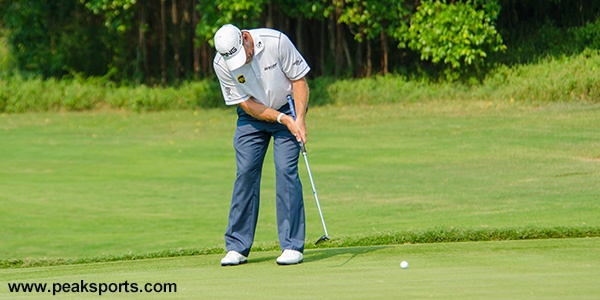How to Manage Pressure in Golf Rounds
What is your view on “pressure?”
How have you played in pressure moments in the past?
Some golfers see pressure as negative and describe tough rounds as nerve-wracking or anxiety-ridden. These golfers tend to fall apart when they start feeling even low levels of pressure.
For these golfers, pressure escalates quickly and throws off their game dramatically. These golfers have difficulty focusing on their shot because all they can think about is, “What if I hit a bad shot?” Or, “What if I miss this putt?”
When you see pressure as a negative thing, pressure becomes your dominant focus instead of just playing the game or the shot in front of you.
There are two things you should know about pressure:
- A little bit of pressure is a good thing. Pressure can become a motivating force that allows you to place all your efforts and focus in the present moment.
- You have the ability to set the pressure thermostat. You can keep pressure in the optimal range by viewing situations as challenges, learning how to effectively focus and utilizing relaxation strategies when necessary.
A good example of effectively managing pressure is the 2018 Farmers Insurance Open.
The Open was an epic drama. Jason Day and Alex Noren battled four rounds and 6 playoff holes before a winner was declared.
Talk about pressure… The six-hole playoff was the longest playoff in the tournament’s 67-year history.
To add to the pressure, Day was seeking to climb back to the No. 1 ranking for the first time since 2016 while Noren was looking for his first PGA Tour win.
Day and Noren matched each other on the first five playoff holes; birdie, birdie, par, par and birdie. Just then, the golfers were informed they would have to continue the playoff the following day due to darkness.
So, after grinding through five playoff holes, Day and Noren would have an entire night to think about what was at stake.
It took only one additional playoff hole and an 18-inch birdie putt for Day to claim the title on Monday morning.
This type of pressure would make many golfers crumble. Interestingly enough, Day and Noren stayed composed.
Neither golfer spoke a word about pressure after the fifth playoff hole. Noren commented on the excitement of the playoff.
NOREN: “Too dark right now, I could barely see the last putt. Very enjoyable. This is what I play for.”
Day also appeared calm and ready for the battle to continue the next day.
DAY: “Alex [Noren] is playing some tremendous golf. I’ll try to get some rest and play all day tomorrow if I need to get a win.”
Day and Noren embraced the pressure and and you can learn to do the same.
Let pressure be your friend rather than your foe, that way, pressure can work for you instead of against you.
How to Manage Pressure in Competition:
Don’t try to be better than your best. Some golfers try too hard which only increases pressure for themselves. Avoiding cramming for the big game.
Embrace the pressure as this is the reason you love to play. Make the added Adrenalin work for you. Know that you are going to feel pumped up and that’s a normal reaction.
Improve your golf performance with mental game coaching for golfers!
Related Sports Psychology Articles
- How to Perform Under Pressure with Confidence
- How to Compete Well in Pressure Moments
- How to Perform Big in Pressure Moments
*Subscribe to The Sports Psychology Podcast on iTunes
*Subscribe to The Sports Psychology Podcast on Spotify
Download a free sports psychology report to improve your mental game!
Learn more about our one-on-one mental game coaching.
Golfer’s Mental Edge

What’s the big sign that your mental game is the weak link in your golf game? When you can’t play consistently as well as when you play a practice or casual round–or your range game is way better than your game on the course. If you suffer from lack of focus, low self-confidence, poor composure or other mental game obstacles on the course, you can’t reach your true potential in golf.
The Golfer’s Mental Edge 2.0 Audio and Workbook program is ideal for any amateur, collegiate, junior, and tour professional golfer.
Golf coaches and instructors would also be wise to teach “The Golfer’s Mental Edge 2.0” principles to their players. This program is perfect for any golfer who wants to improve performance and consistency by managing their mind better on the course.

